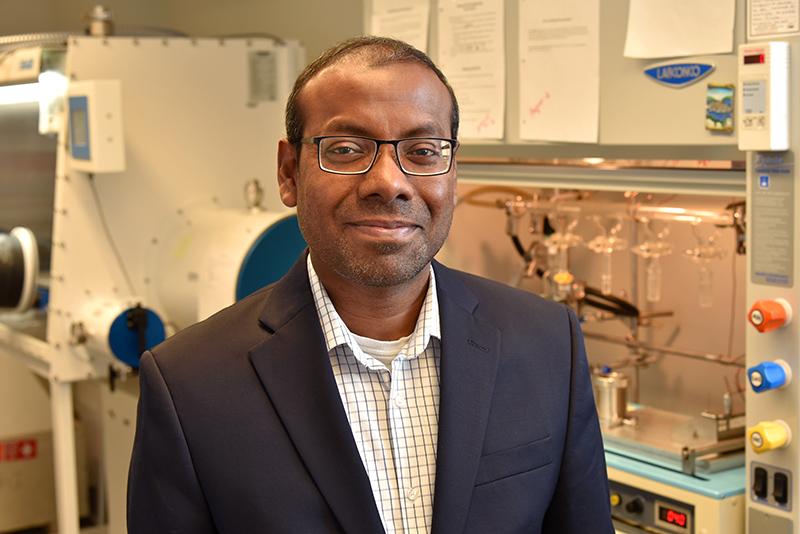Outstanding work as an educator and mentor have earned Mohammad Islam, an associate professor of physics, the college’s President’s Award for Teaching Excellence.
“In the classroom, he is inspiring and manages to boil down complicated physical concepts into a form that everyone can understand,” wrote Vincent DiBiase, a 2017 Oswego alumnus now attending graduate school at Syracuse University. Having taken materials science classes, his capstone and independent studies courses with Islam -- in large part because of how well he translated those concepts -- DiBiase said Islam “is among the top echelon” as an educator.
“His classes never felt rushed as to get all the material in quickly, but they also didn’t drag on either,” DiBiase wrote. “They kept a good pace that most students could keep up with. If students had problems following along or with concepts he was covering that day he would not hesitate to slow down and explain further.”
DiBiase praised “priceless advice” and guidance from Islam for putting him on a successful path. “I often came to him with questions about graduate school that he answered ten times over and even included his personal experiences,” DiBiase noted. “He helped make my transition to graduate school that much easier. I truly believe his recommendation was paramount as to why I received a Graduate Fellowship to Syracuse University. His doors are always open for students with questions.”
Islam’s research in renewable energy, largely receiving attention and grant support for his sodium-ion battery work, provides opportunities for students to learn and advance to top graduate and research programs, nominators said.
‘Highest quality’
SUNY Oswego 2016 graduate Mateusz Zuba said Islam’s “guidance and wisdom” was pivotal for Zuba's path to performing competitive research as a materials science and engineering Ph.D candidate at Binghamton University.
“His work on energy storage battery materials brings insight into the battery research community as well as encourages young students, such as myself, to pursue a career in energy storage research,” Zuba wrote. “As a professor, as an advisor and as a friend, Dr. Islam is of the highest quality.”
As part of his research endeavors, Islam earned “an extremely competitive Department of Energy sponsored visiting faculty fellowship at National Renewable Energy Laboratory (NREL),” Zuba wrote. “As part of his awarded fellowship, SUNY Oswego students working with Dr. Islam are encouraged to join his research at NREL.”
Zhogquan Gu, who teaches in the School of Microelectronics of top-tier Chinese institution Fudan University, was pursuing his Ph.D. at Drexel University when he met Islam, who was a research assistant professor there in materials science and engineering.
“Islam gracefully took me under his mentorship and help me initiate my research in complex oxide thin film, which I now have been continuing and building my career on,” Gu wrote. “He is a dedicated and extremely efficient teacher. He strongly believes it is his fundamental responsibility to prepare his students for their professional lives after graduation.”
Considerable skills
Shashi Kanbur, professor and chair of physics, described Islam as “a rigorous teacher who strives to get the best out of his students” by providing interesting analogies, novel strategies and worked examples to connect students with the material.
An Oswego faculty member since 2014, Islam revived upper-division courses in materials science and thermodynamics, which have become popular choices with majors, Kanbur noted. Teaching upper-division laboratory courses in quantum mechanics and optics, which are vital elements of Oswego’s physics degree, “requires considerable effort to design such experiments and to mentor students through the process of getting results that can be analyzed,” Kanbur explained.
“Experiments take 3-4 weeks and require an extensive write-up,” Kanbur wrote. “It requires considerable teaching and mentorship skills to guide students through this process and Dr. Islam has excelled at this and provided the backbone of upper-division physics instruction in our department."
Kanbur also praised Islam for developing a nanophysics laboratory and mentoring students who have gone on to graduate school in this field. In addition to DiBiase and Zuba, Oswego graduates mentored by Islam have pursued advanced studies with such institutions as the Rochester Institute of Technology and NERL.
Mathematics professor Ampalavanar Nanthakumar said Islam, who earned a Ph.D. in applied physics from Columbia University, could have joined any large research institution with his established abilities. “However, he chose to teach primarily at teaching institutions,” Nanthakumar wrote. “He likes to engage the undergraduate students by challenging them to raise their level of curiosity in the sciences and that too particularly in physics.”
Islam’s student comments talk of the “stimulating experience” of taking his classes, Nanthakumar noted, while as a researcher Islam’s work remains “second to none.”
“His service to our institution is impeccable,” Nanthakumar wrote. “He is a man of integrity, honesty and nobility.”
The award recognizes continuous teaching excellence and is chosen by members of the college’s Committee on Learning and Teaching.




